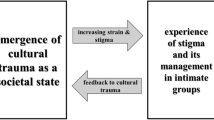Abstract
The affective turn in social and cultural studies has reorientated the study of queer subjectivity to the conditions of a history marked by shame and insult. Using textual sources from comedy sketch shows, The Catherine Tate Show and Little Britain, this article presents a psychosocial reading of ‘shame’ and ‘insult’ in contemporary representations of gay male sexuality. This article illustrates how humour and comedy are used to regulate social norms and air contemporary anxieties about the changing social values in relation to sexuality in the UK context. The analysis is located within a critical reflection on the transformative politics of the Gay Shame movement as an alternative movement to Gay Pride. The article concludes by considering the distinction between a cultural ‘coming out’ of shame and the affective consequences that ‘shame’ can have in individual narratives of sexual identity formation and suicidal distress.
Similar content being viewed by others
Notes
I recognise the importance of LGB and T political coalitions and that trans people are also included in some studies of suicidal risk. However for the purpose of this paper my focus is on the intersection of accounts on shame and sexuality, and trans people are only mentioned when research specifically included them.
I am grateful to Catherine Tate and the producers at Tiger Aspect production for allowing the use of this transcript and image.
Given the visual nature of reading expressions of affect the reader is encouraged to view the sketches mentioned in order to give depth to the reading presented here.
I am grateful to Matt Lucas, David Walliams and the BBC for permitting the use of the following transcript.
The BBC has consistently defended Chris Moyles despite a number of sources noting the sensitivity of the age group he broadcasts to. See http://www.broadcastnow.co.uk/gambaccini-chris-moyles-causes-human-suffering/2022741.article.
References
Ahmed, S. (2004) The Cultural Politics of Emotion. Edinburgh, UK: Edinburgh University Press.
American Psychiatric Association. (1952) Diagnostic and Statistical Manual of Mental Disorders. Washington DC: American Psychiatric Association.
Bersani, L. and Phillips, A. (2008) Intimacies. Chicago, IL: Chicago University Press.
Billig, M. (2005) Laughter and Ridicule: Towards a Social Critique of Humour. London: Sage.
Chandler, M.J., Lalonde, C., Sokol, B. and Hallett, D. (2003) Personal persistence, identity development, and suicide: A study of native and non-native North American adolescents. Monographs of the Society for Research in Child Development, Serial no. 273 68 (2): 1–138.
Cowan, K. and Valentine, G. (2006) Tuned Out: The BBC's Portrayal of Lesbian and Gay People. London: Stonewall.
Demos, E.V. (1995) Exploring Affect: The Selected Writing of Silvan S. Tomkins. Cambridge, UK: Cambridge University Press.
English, J.F. (1994) Comic Transactions: Literature, Humor, and the Politics of Community in Twentieth-Century Britain. Ithaca: Cornell University Press.
Eribon, D. (2004) Insult and the Making of the Gay Self. London: Duke University Press.
Freud, S. (1905/1953) Three Essays on the Theory of Sexuality. London: Hogarth Press.
Frosh, S. (2010) Psychosocial textuality: Religious identities and textual constructions. Subjectivity 3 (4): 426–441.
Giddens, A. (1992) The Transformation of Intimacy: Sexuality, Love & Eroticism in Modern Societies. Cambridge, UK: Polity Press.
Greco, M. and Stenner, P. (eds.) (2008) Emotions: A Social Science Reader. London: Routledge.
Halperin, D. (2007) What Do Gay Men Want? An Essay on Sex, Risk, and Subjectivity. Ann Arbor, MI: University of Michigan Press.
Halperin, D. and Traub, V. (eds.) (2009) Gay Shame. London and Chicago, IL: The University of Chicago Press.
Hillier, L. and Harrison, L. (2004) Homophobia and the production of shame: Young people discovering the fault lines in discourse about same sex attraction. Culture, Health and Sexuality 6 (1): 79–94.
Irving, J.M. (2009) Shame comes out of the closet. Sexuality Research & Social Policy: Journal of NSRC 6 (1): 70–79.
Israel, G.E. and Tarver, D.E. (1997) Transgender Care: Recommended Guidelines, Practical Information & Personal Accounts. Philadelphia, PA: Temple University Press.
Johnson, K. et al (2007) Understanding Suicidal Distress and Promoting Survival in LGBT Communities. Brighton: HSPRC University of Brighton.
King, M. et al (2003) Mental health and quality of life of gay men and lesbians in England and Wales: Controlled, cross-sectional study. British Journal of Psychiatry 183 (6): 552–558.
King, M. et al (2008) A systematic review of mental disorder, suicide, and deliberate self harm in lesbian, gay and bisexual people. BMC Psychiatry 8: 70, http://www.biomedcentral.com/1471-244X/8/70, accessed 28 July 2009.
Kuzniar, A.A. (2009) Sublime shame. GLQ: Journal of Lesbian and Gay Studies 15 (3): 499–512.
Lester, D. (1997) The role of shame in suicide. Suicide & Life-Threatening Behavior 27 (4): 352–361.
Lynd, H.M. (1958) On Shame and the Search for Identity. London: Routledge and Kegan Paul.
Love, H. (2007) Feeling Backward: Loss and the Politics of Queer History. London: Harvard University Press.
McDermott, E., Roen, K. and Scourfield, J. (2008) Avoiding shame: Young LGBT people, homophobia and self-destructive behaviours. Culture, Health & Sexuality: An International Journal of Research, Intervention and Care 10 (8): 815–829.
Medhurst, A. (2007) A National Joke: Popular Comedy and English Cultural Identities. Oxon and New York: Routledge.
Meyer, I. (2003) Prejudice, social stress and mental health in lesbian, gay and bisexual populations. Psychological Bulletin 129 (5): 674–697.
Moore, P. (2004) Beyond Shame: Reclaiming the Abandoned History of Radical Gay Sexuality. Boston, MA: Beacon Press.
Munt, S. (1992) Sex and sexuality. In: A. Millwood Hargrave (ed.) Broadcasting Standards Council Annual Review. London: John Libbey and Company.
Munt, S. (2008) Queer Attachments: The Cultural Politics of Shame. Aldershot, UK: Ashgate.
Probyn, E. (2005) Blush: Faces of Shame. London: Minneapolis Press.
Rivers, I. (2002) Developmental issues for lesbian and gay youth. In: A. Coyle and C. Kitzinger (eds.) Lesbian & Gay Psychology. Oxford: BPS Blackwell.
Roen, K., Scourfield, J. and McDermott, E. (2008) Making sense of suicide: A discourse analysis of young people's talk about suicidal subjecthood. Social Science and Medicine 67 (12): 2089–2097.
Roseneil, S. (2002) The heterosexual/homosexual binary: Past, present and future. In: D. Richardson and S. Steidman (eds.) Handbook of Lesbian & Gay Studies. London: Sage.
Sedgwick, E.K. (2003) Touching Feeling: Affect, Pedagogy, Performativity. Durham and London: Duke University Press.
Sedgwick, E.K. and Frank, A. (eds.) (1995) Shame and its Sisters: A Silvan Tomkins Reader. Durham and London: Duke University Press.
Stein, A. (2006) Shameless: Sexual Dissidence in American Culture. New York: New York University Press.
Stenner, P. (2004) Is autopoietic systems theory alexithymic? Luhmann and the socio-psychology of emotions. Soziale Systeme 10 (1): 159–185.
Stenner, P. (2007) The adventure of psychosocial studies: Revisioning the space between the psychic and the social. Inaugural Lecture, 18 May, http://www.brighton.ac.uk/sass/contact/staffprofiles/stenner/inaugural_lecture.pdf, accessed 28 January 2009.
Stockton, K.B. (2006) Beautiful Bottom, Beautiful Shame: Where ‘Black’ Meets ‘Queer’. London: Duke University Press.
Warner, M. (ed.) (1993) Fear of a Queer Planet: Queer Politics and Social Theory. Minneapolis, MN and London: University of Minnesota Press.
Warner, J. et al (2004) Rates and predictors of mental illness in gay men, lesbians and bisexual men and women: Results from a survey based in England and Wales. British Journal of Psychiatry 185 (6): 479–485.
Weeks, J. (2007) The World We Have Won the Remaking of Erotic and Intimate Life. London: Taylor Francis.




